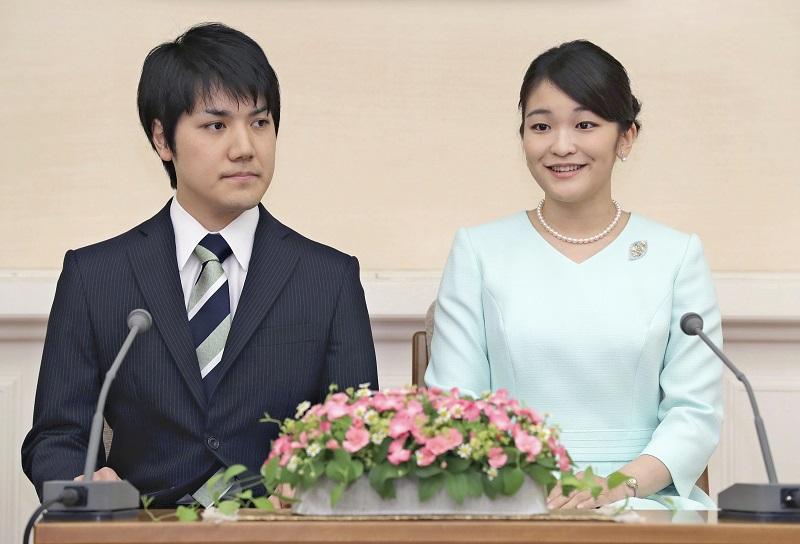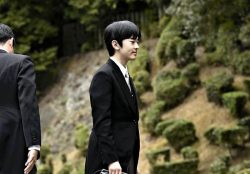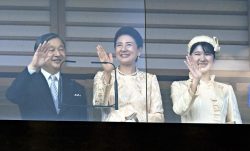
Princess Mako and Kei Komuro speak at a press conference in Minato Ward, Tokyo, after their engagement was unofficially confirmed in September 2017.
16:47 JST, September 2, 2021
The upcoming wedding of Princess Mako and Kei Komuro is shaping up to be unlike any other. Princess Mako, the eldest daughter of Crown Prince Akishino, and Komuro are not planning to hold engagement or wedding rituals, and the princess also has expressed her intention to refuse the financial settlement normally provided when a female member leaves the Imperial family upon her marriage.
The novel coronavirus pandemic engulfing Japan is also among the factors that have resulted in the wedding being put on hold for more than three years.
The Imperial family has previously avoided announcing any celebratory events shortly after a natural disaster or other tragic incidents, out of consideration for those affected.
According to sources, preparations were being made in 2020 to announce a new schedule for events related to the wedding between Princess Mako and Komuro, both of whom are 29, but these were postponed due to the coronavirus crisis and other factors. However, the pandemic has dragged on for more than 1½ years, and it remains difficult to predict when it will be contained.
Public criticism of the marriage, sparked by financial problems involving Komuro’s mother, is also muddying the water. “There are no signs of improvement regarding this sentiment,” a senior official of the Imperial Household Agency said.
The princess has apparently been distressed by magazine articles critical of Komuro’s family and the rising tide of public opposition to the marriage.
She has been her usual cheerful self while performing public duties, but in private she has been suffering. Reportedly, she has told people close to her the situation makes her stomach ache.
A senior agency official admitted that the princess is being “stretched to the limit” emotionally.
Moves to hold the wedding before the end of 2021 are apparently being nudged along because Komuro’s financial situation is likely to improve and concerns about the princess’ physical and mental state.
Tradition at risk
Arrangements are being made for the marriage to go ahead without holding several traditional engagement and wedding ceremonies.
Prince Akishino has stated “a situation in which many people are content [with the marriage] and happy [for the couple]” was a condition for holding the official engagement ceremony. The decision to skip this and other events appears to indicate this situation has yet to emerge.
The current Imperial family wedding rituals took shape during the Meiji era (1868-1912) and were stipulated in a 1910 ordinance. Although this ordinance was abolished in 1947 after the end of World War II, these rituals have continued to be followed without exception whenever an Imperial family member gets married.
The marriage of a female member of the Imperial family involves six traditional rituals, including the Nosai-no-Gi ceremonial delivery of betrothal gifts, and the Choken-no-Gi ceremony, in which the Emperor and Empress receive the princess’ farewell. In November 2017, before the wedding was delayed, all these rituals were on track to be held and dates had been announced.
Concerns have been expressed over the possibility of the wedding going ahead without these traditional rituals being conducted.
“The Imperial family has earned the support of the people by showing it carefully upholds traditions, even while taking modern-day factors into account,” said Nagoya University Associate Prof. Hideya Kawanishi, an expert on contemporary Japanese history. “Not holding the engagement and wedding ceremonies could undermine the raison d’etre of the Imperial family.”
Unexpected steps
The princess has indicated she intends to refuse the payment provided when a female member leaves the Imperial family, triggering discussions over whether this is legally possible.
The Imperial Household Finance Law stipulates that an Imperial family member will receive a one-time payment when leaving the family due to marriage or other reasons, to help them maintain their dignity.
The committee on the Imperial household’s finances — which consists of eight members, including the prime minister, the speaker of the House of Representatives and the president of the House of Councillors — has traditionally determined the specific amount to be paid. However, the committee has never discussed whether this money should be paid in the first place.
“Not accepting this payment falls outside the scope of the law,” a senior agency official told The Yomiuri Shimbun. “The interpretation of the law might need to be changed to allow the refusal of this payment.”
As the payment could trigger a public backlash given the controversy over the Komuro family’s finances, even some agency officials have privately suggested that consideration should be given to finding a way for the payment to be declined.
Succession a pressing task
The Imperial House Law stipulates that a female member loses her status when she marries a commoner. When Princess Mako ties the knot, the number of unmarried female members of the Imperial family will fall from six to five.
Only men can inherit the throne, and currently there are just three heirs in the line of succession — the crown prince, his son Prince Hisahito, and Prince Hitachi, the 85-year-old brother of the Emperor Emeritus.
Amid concerns about the dwindling number of Imperial family members, a government advisory panel has been discussing methods for ensuring stable Imperial succession. The panel is headed by Atsushi Seike, head of the Promotion and Mutual Aid Corporation for Private Schools in Japan.
At a press conference Wednesday, Chief Cabinet Secretary Katsunobu Kato touched on the princess’ wedding. “The government will quietly watch how the situation unfolds,” Kato said.
Kato also indicated the government intended to let the panel continue examining the future shape of Imperial succession.
Top Articles in Society
-

Producer Behind Pop Group XG Arrested for Cocaine Possession
-

Man Infected with Measles Reportedly Dined at Restaurant in Tokyo Station
-

Woman with Measles Visited Hospital in Tokyo Multiple Times Before Being Diagnosed with Disease
-

Bus Carrying 40 Passengers Catches Fire on Chuo Expressway; All Evacuate Safely
-

Tokyo Skytree’s Elevator Stops, Trapping 20 People; All Rescued (Update 1)
JN ACCESS RANKING
-

Producer Behind Pop Group XG Arrested for Cocaine Possession
-

Japan PM Takaichi’s Cabinet Resigns en Masse
-

Man Infected with Measles Reportedly Dined at Restaurant in Tokyo Station
-

Israeli Ambassador to Japan Speaks about Japan’s Role in the Reconstruction of Gaza
-

Videos Plagiarized, Reposted with False Subtitles Claiming ‘Ryukyu Belongs to China’; Anti-China False Information Also Posted in Japan


























